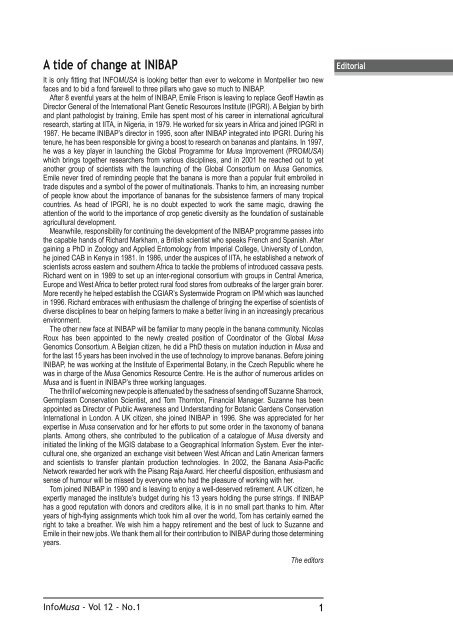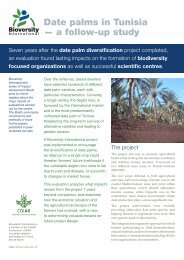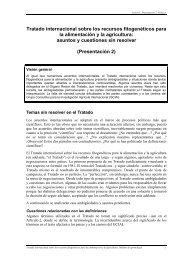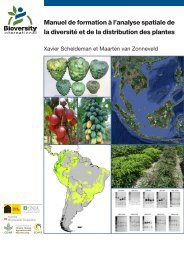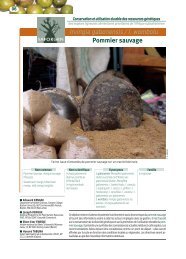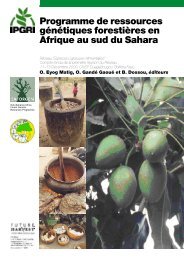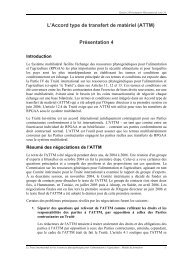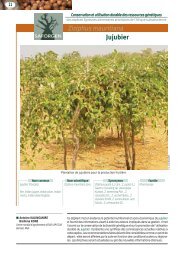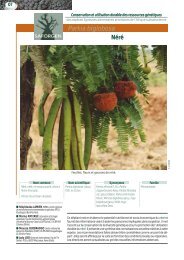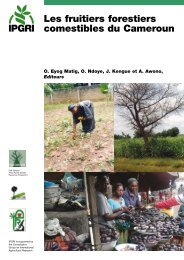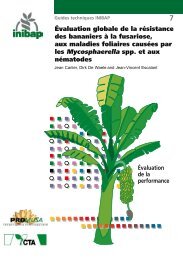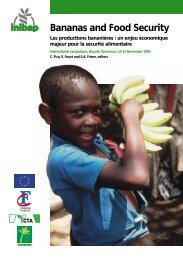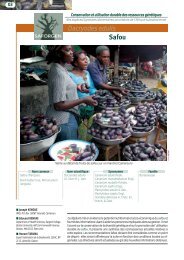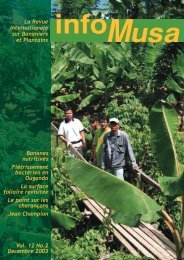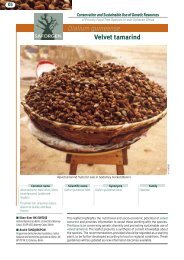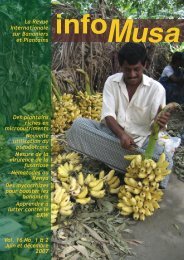Château-Musa - Bioversity International
Château-Musa - Bioversity International
Château-Musa - Bioversity International
Create successful ePaper yourself
Turn your PDF publications into a flip-book with our unique Google optimized e-Paper software.
A tide of change at INIBAP<br />
It is only fitting that INFOMUSA is looking better than ever to welcome in Montpellier two new<br />
faces and to bid a fond farewell to three pillars who gave so much to INIBAP.<br />
After 8 eventful years at the helm of INIBAP, Emile Frison is leaving to replace Geoff Hawtin as<br />
Director General of the <strong>International</strong> Plant Genetic Resources Institute (IPGRI). A Belgian by birth<br />
and plant pathologist by training, Emile has spent most of his career in international agricultural<br />
research, starting at IITA, in Nigeria, in 1979. He worked for six years in Africa and joined IPGRI in<br />
1987. He became INIBAP’s director in 1995, soon after INIBAP integrated into IPGRI. During his<br />
tenure, he has been responsible for giving a boost to research on bananas and plantains. In 1997,<br />
he was a key player in launching the Global Programme for <strong>Musa</strong> Improvement (PROMUSA)<br />
which brings together researchers from various disciplines, and in 2001 he reached out to yet<br />
another group of scientists with the launching of the Global Consortium on <strong>Musa</strong> Genomics.<br />
Emile never tired of reminding people that the banana is more than a popular fruit embroiled in<br />
trade disputes and a symbol of the power of multinationals. Thanks to him, an increasing number<br />
of people know about the importance of bananas for the subsistence farmers of many tropical<br />
countries. As head of IPGRI, he is no doubt expected to work the same magic, drawing the<br />
attention of the world to the importance of crop genetic diversity as the foundation of sustainable<br />
agricultural development.<br />
Meanwhile, responsibility for continuing the development of the INIBAP programme passes into<br />
the capable hands of Richard Markham, a British scientist who speaks French and Spanish. After<br />
gaining a PhD in Zoology and Applied Entomology from Imperial College, University of London,<br />
he joined CAB in Kenya in 1981. In 1986, under the auspices of IITA, he established a network of<br />
scientists across eastern and southern Africa to tackle the problems of introduced cassava pests.<br />
Richard went on in 1989 to set up an inter-regional consortium with groups in Central America,<br />
Europe and West Africa to better protect rural food stores from outbreaks of the larger grain borer.<br />
More recently he helped establish the CGIAR’s Systemwide Program on IPM which was launched<br />
in 1996. Richard embraces with enthusiasm the challenge of bringing the expertise of scientists of<br />
diverse disciplines to bear on helping farmers to make a better living in an increasingly precarious<br />
environment.<br />
The other new face at INIBAP will be familiar to many people in the banana community. Nicolas<br />
Roux has been appointed to the newly created position of Coordinator of the Global <strong>Musa</strong><br />
Genomics Consortium. A Belgian citizen, he did a PhD thesis on mutation induction in <strong>Musa</strong> and<br />
for the last 15 years has been involved in the use of technology to improve bananas. Before joining<br />
INIBAP, he was working at the Institute of Experimental Botany, in the Czech Republic where he<br />
was in charge of the <strong>Musa</strong> Genomics Resource Centre. He is the author of numerous articles on<br />
<strong>Musa</strong> and is fluent in INIBAP’s three working languages.<br />
The thrill of welcoming new people is attenuated by the sadness of sending off Suzanne Sharrock,<br />
Germplasm Conservation Scientist, and Tom Thornton, Financial Manager. Suzanne has been<br />
appointed as Director of Public Awareness and Understanding for Botanic Gardens Conservation<br />
<strong>International</strong> in London. A UK citizen, she joined INIBAP in 1996. She was appreciated for her<br />
expertise in <strong>Musa</strong> conservation and for her efforts to put some order in the taxonomy of banana<br />
plants. Among others, she contributed to the publication of a catalogue of <strong>Musa</strong> diversity and<br />
initiated the linking of the MGIS database to a Geographical Information System. Ever the intercultural<br />
one, she organized an exchange visit between West African and Latin American farmers<br />
and scientists to transfer plantain production technologies. In 2002, the Banana Asia-Pacific<br />
Network rewarded her work with the Pisang Raja Award. Her cheerful disposition, enthusiasm and<br />
sense of humour will be missed by everyone who had the pleasure of working with her.<br />
Tom joined INIBAP in 1990 and is leaving to enjoy a well-deserved retirement. A UK citizen, he<br />
expertly managed the institute’s budget during his 13 years holding the purse strings. If INIBAP<br />
has a good reputation with donors and creditors alike, it is in no small part thanks to him. After<br />
years of high-flying assignments which took him all over the world, Tom has certainly earned the<br />
right to take a breather. We wish him a happy retirement and the best of luck to Suzanne and<br />
Emile in their new jobs. We thank them all for their contribution to INIBAP during those determining<br />
years.<br />
The editors<br />
Info<strong>Musa</strong> - Vol 12 - No.1 1<br />
Editorial


